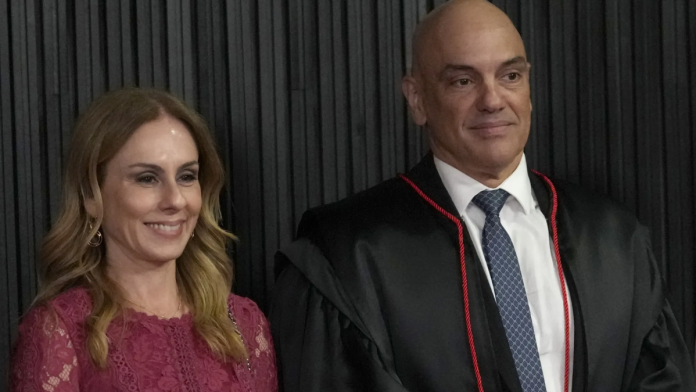The United States government has taken a sharp step against Brazil by imposing sanctions on Viviane Barci de Moraes, the wife of Supreme Court Justice Alexandre de Moraes. Justice de Moraes was in charge of the high-profile case that sentenced former President Jair Bolsonaro to 27 years in prison earlier this month. Viviane de Moraes, a lawyer by profession, was targeted under the Global Magnitsky Act, a US law used to punish people accused of serious human rights violations.
The sanctions do not stop at individuals. Reports suggest that a family-owned holding company linked to Justice de Moraes has also been blacklisted. This move blocks access to property and assets connected to the family within the United States. Local media also revealed that several other judges, who worked alongside him in the Supreme Court, may have had their US visas revoked as well. However, these judges have not confirmed this individually.
In response, Justice de Moraes issued a public statement stressing that Brazil’s institutions remain strong. He argued that the measures were unfair, claiming they violated both international law and the independence of the judiciary.
Visa Revocations Target Moraes Allies
The sanctions have been paired with new visa restrictions. The US revoked the visa of Brazil’s Solicitor-General Jorge Messias, who openly criticized Washington’s decision on his social media. He described the move as an “unjust attack” but vowed to continue performing his official duties with determination.
The impact of these measures has spread further. Brazil’s Health Minister Alexandre Padilha revealed that he was given a US visa with strict limitations. The visa allowed him to attend the United Nations General Assembly in New York but restricted his movement to a few blocks near the UN headquarters and his hotel. Calling the visa “unacceptable,” Padilha decided not to travel and instead stayed in Brazil, where he joined public demonstrations against the idea of granting amnesty to Bolsonaro.
The administration of President Luiz Inácio Lula da Silva has also taken formal action. It filed a complaint with the United Nations, condemning what it described as unfair treatment of its officials by Washington.
Trump slams Bolsonaro’s 27-year prison term as U.S. weighs punishing Brazil
US Justification for the Actions
According to the US State Department, the sanctions were imposed because of what it called “abuse of authority” by Justice Alexandre de Moraes. Officials accused him of using his position to silence political opponents, order unfair detentions, and limit free speech. Washington stated that these actions amounted to serious human rights abuses and therefore fell under the Global Magnitsky Act.
The US administration argued that the steps were necessary to “hold him accountable” for what it sees as repeated violations. These measures, it said, are part of a broader effort to respond to censorship, misuse of the courts, and targeting of political adversaries in Brazil.
The wave of sanctions is not an isolated act. It comes on top of new tariffs of 50% that the United States has applied to many Brazilian exports. These combined actions mark one of the most serious confrontations in recent years between the two countries.
For Brazil, the timing of these sanctions has added pressure as the country deals with the aftermath of Bolsonaro’s conviction. The former president was found guilty of plotting to stay in power illegally after losing the 2022 election. Although sentenced to nearly three decades in prison, Bolsonaro remains free while his legal team pursues an appeal.
Brazilian leaders, including President Lula, have made clear that they view the US actions as attacks on the country’s sovereignty. They argue that such measures weaken international cooperation and put unnecessary strain on relations between the two nations.


